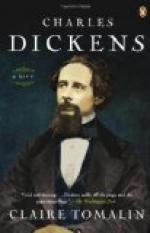Such, as I have had occasion to say before in speaking of similar analyses, such are the dry bones of the story. Pip’s character is well drawn. So is that of Joe. And Mr. Jaggers, the criminal’s friend, and his clerk, Wemmick, are striking and full of a grim humour. Miss Havisham and her protegee, Estella, whom she educates to be the scourge of men, belong to what may be called the melodramatic side of Dickens’ art. They take their place with Mrs. Dombey and with Miss Dartle in “David Copperfield,” and Miss Wade in “Little Dorrit”—female characters of a fantastic and haughty type, and quite devoid, Miss Dartle and Miss Wade especially, of either verisimilitude or the milk of human kindness.
“Great Expectations” was completed in August, 1861, and the first number of “Our Mutual Friend” appeared in May, 1864. This was an unusual interval, but the great writer’s faculty of invention was beginning to lose its fresh spring and spontaneity. And besides he had not been idle. Though writing no novel, he had been busy enough with readings, and his work on All the Year Round. He had also written a short, but very graceful paper[30] on Thackeray, whose death, on the Christmas Eve of 1863, had greatly affected him. Now, however, he again braced himself for one of his greater efforts.
Scarcely, I think, as all will agree, with the old success. In “Our Mutual Friend” he is not at his best. It is a strange complicated story that seems to have some difficulty in unravelling itself: the story of a man who pretends to be dead in order that he may, under a changed name, investigate the character and eligibility of the young woman whom an erratic father has destined to be his bride. A golden-hearted old dust contractor, who hides a will that will give him all that erratic father’s property, and disinherit the man aforesaid, and who, to crown his virtues, pretends to be a miser in order to teach the young woman, also aforesaid, how bad it is to be mercenary, and to induce her to marry the unrecognized and seemingly penniless son; their marriage accordingly, with ultimate result that the bridegroom turns out to be no poor clerk, but the original heir, who, of course, is not dead, and is the inheritor of thousands; subsidiary groups of characters, of course, one which I think rather uninteresting, of some brand-new




